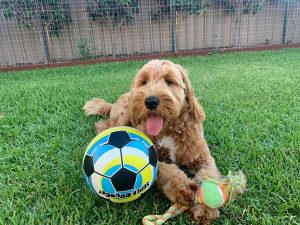The French Bulldog is a small, purebred dog originally bred to be a companion. Known for their expressive personalities, these dogs often make a variety of funny sounds to “talk” with their owners. Their calm and friendly nature makes them a great choice for families. If you’re looking for a dog that’s affectionate, social, loyal, and fun to be around, a Frenchie could be the perfect fit for you. They’re among the top five most popular breeds in many countries, including the U.S., Canada, Australia, and South Africa.
There are also some variations of the breed, like the fluffy French Bulldog (also called long-haired Frenchie) and Mini French Bulldogs. Some rare colors, like blue, have also become more common. Recently, breeders introduced a new type called the Hairless Frenchie. However, this version is considered unhealthy and not widely accepted within the breed standard.
If you are looking for a complete guide about the French Bulldogs, keep reading this article to find everything about them including history, pros and cons, temperament, grooming needs, and health-related issues.
Adopt, don’t shop. Try to find a dog in a shelter as hundreds of dogs are waiting to be adopted in kill shelters.
Table of Contents
History of the French Bulldogs:
The cute-faced French Bulldog was not originated in England and was intended to be a toy variety of the Bulldog. At the time when lace workers of Nottingham city were moved to France for the sake of work in the nineteenth century, they brought the Toy Bulldog with them as it was a very popular breed among them. Later they were crossed with the local Parisian Ratters to form the French Bulldogs.
This dog flourished from France to Europe and within a few years, its glamor also reached America. In 1896, the Americans saw the French Bulldog at the Westminster Kennel Club show and their mouths were left open. Soon, it got the nickname “Frenchie” which is still used for this loyal and loveable dog.
Physical features:
The French Bulldog is an adorable and charming dog that is well known for its wrinkled face. It has a compact but muscular body while the eyes are big and dark brown.
It has a shiny coat that is required to be brushed 2-3 times a week to keep it tidy. However, its shedding tendency is between moderate to high so it may not be a suitable breed for those with allergies.
They usually come in colors like fawn, white, and cream along with the brindle patterns on the coat and black mask. Another unique feature of the breed is its ears and skull. It has bat-like ears and a flat, rounded skull.
Also remember, it is a brachycephalic breed- a dog with a flat face and short nose is called a brachycephalic dog and such dogs usually have breathing issues.
Size and Weight:
The average weight of a male French Bulldog would be between 20 to 28 pounds while its height would be anywhere between 11 to 13 inches at the shoulder. The females would weigh between 17 to 24 pounds and stand between 8 to 13 inches.
According to the AKC standard, this breed should not be more than the height of 11-12 inches while the weight should not exceed 28 pounds.
French Bulldog Pros and Cons?
It is the most important part of this guide as you’ll be able to conclude this dog’s compatibility with your lifestyle. It is very important to get a dog that you can easily maintain or you may end up leaving your dog in a shelter.
Pros:
Perfect companion:
Being bred specifically for companionship, it is an excellent companion dog. If you’re looking for a dog that’s always beside you, whether you’re lying on a couch or walking on a track, Frenchie is the dog you should choose.
Charming personality:
No one can control the love he feels for this dog no matter whether he is the owner of this dog or not. They are the funniest and most entertaining dogs you will ever see. Undoubtedly, this dog will keep you entertained forever.
Intelligent:
Well, the French Bulldog is not an extraordinary genius breed but it has a fair amount of intelligence and smartness that can pick up your commands. Although this dog can sometimes be stubborn, you shouldn’t treat it like a kid and react calmly.
Social:
The most important thing when looking for a family dog is its socio-friendly behavior whether it behaves well with kids and strangers or not. Luckily, this dog is very good around kids. Therefore, if you have kids in your house and are planning for a dog then it is an ideal breed for you.
Easy to Groom:
These dogs have short, shiny, and flat coats that make their grooming easy while bathing them once a month would be enough. Here are the things you should and shouldn’t do while grooming your dog.
Ideal for apartments:
Due to their small size and even temper, they are some of the best and most highly recommended dogs for apartment residents. The French bulldog doesn’t require much exercise. Having this dog will not irritate your neighbors because of its low barking tendency.
Cons:
Separation Anxiety:
One of the major behavioral issues of this dog is separation anxiety. This dog is very prone to this issue whenever it is left alone for a longer period. Your dog may develop destructive behavior as a result of separation anxiety.
Vast Health Issues:
It’s not a hidden thing that this breed can suffer from various health issues such as :
- Diarrhea
- Allergies
- Brachycephalic syndrome
- Cherry eye
- Elongated soft palate
Finding a breeder who is reputable and whose breeds are free of diseases can overcome these problems.
Shedding coat:
The French Bulldog has a high-shedding coat that sheds throughout the year. Due to this, it is incompatible with allergy sufferers.
Heat and cold Sensitive:
As the French Bulldog is a brachycephalic breed, because of this, it has a hard time regulating its body temperature. When a Frenchie dog runs, to normalize its body temperature, this dog will take a much longer time to cool down than non-brachycephalic-faced dogs.
Do not try to exceed their physical limitations because they have few marked requirements. It is also important to provide easy access to drinking water and to avoid letting them go out in hot weather.
Personality:
It is an affectionate and smart dog that always desires to be around its owner. Nothing is more important to it than spending time with its owner. It will make you laugh with its goofy behavior. You can train this dog easily by using a few tactics like rewarding it with food, praising it, and not being harsh on it.
Temperament:
The French Bulldog is often related to the “take a chill pill” dog, however, it enjoys playing with its owner. If you train and socialize it properly, it will also get along well with other animals. It is a free thinker and is always ready to explore new games and learn new skills.
As an owner of this breed, you have to be naughty as well, because they require a keeper who laughs along with them. According to the president of the French Bulldog Club of America (FBDCA), if you are considering this dog you have to be patient, kind-tempered, consistent, and affectionate.
Grooming:
You have to brush your dog’s coat once a week to maintain its beauty, cleanliness, and health. It will also require bathing once a month. Keep a close eye on their wrinkled face because they may get infections if not cared for properly.
There is one drawback of wrinkled-faced dogs; their skin gets lesions or scabs. Therefore, regularly check their face, and if unfortunately, your pup suffers from this see your vet right away.
Along with that, brush their teeth regularly to prevent any oral diseases and keep their ears clean. Don’t forget to clip their nails or they may injure themselves or you.
Training:
Like every dog, your French Bulldog will require early training. You also need to socialize it during its puppyhood, as well as, train it not to panic when you are away, so it won’t develop separation anxiety. If the breed is trained properly it will allow stranger interaction and will also get along well with other dogs and cats.
The training should be started on day 1 when they arrive at your house. Show them their boundaries and try to crate-train and potty-train them.
Exercise:
They are pretty intelligent dogs however you have to be very calm and use treats in the training session to get positive results. Potty-training them can be a difficult task but you can do it with patience and consistency.
Since they have a short muzzle, therefore, avoid high-intensity exercises that may trigger their breathing problem. Multiple gentle walks are enough for them and must have a gap between each walk. 45 to 60 minutes of daily exercise and walks would be enough for your dog.
Common Health Issues:
Not every French Bulldog has to suffer from these diseases but according to a study held in 2018 at the Royal Veterinary College UK, they examined around 2,228 French bulldogs and concluded that 17.9% of dogs of this breed can suffer from skin allergies, 14% from an ear infection, 7.5% from diarrhea, and 3.2% can suffer from conjunctivitis. So let’s learn about them one by one:
Breathing Problem:
This issue is very common in this dog because of its short muzzle. This condition can occur to almost every dog of this breed and other related breeds such as Pugs, Bulldogs, and Boxers. The symptoms of this disease are coldness similar to humans, coughing, and lethargy.
Conjunctivitis:
Since this breed has a brachycephalic face, it has a higher risk of occurring conjunctivitis. This mostly happens due to bacterial infection, viral infection, or some allergic reaction. Therefore, keep an eye on your dog and if you notice red eyes or blinking more than usual, you should visit your vet right away.
Skinfold Dermatitis:
Due to their folded or wrinkled facial skin, these dogs can suffer from dermatitis. Moreover, this problem can also occur in other parts of the body that are folded such as the neck, and armpits.
If your pup has excessive itching or is biting and scratching on a specific area, it may be due to dermatitis. You have to keep those areas dry and clean to prevent this skin condition.
Ear Infection:
Because of their narrow ear canal, they are prone to ear infections. Along with that, allergies can also lead to an ear infection problem. If their ear gland swells up, that creates more wax than routine so it can cause overproduction of ear tissues and make the ear canal further narrow.
This is a very painful condition. You can notice this issue if your pup scratches its ears excessively or if you see any redness inside the ear.
Diarrhea:
Indigestion is very common in French bulldogs therefore supervision of their diet is essential. They are very sensitive to parasites and viruses, which can lead to diarrhea.
Take notice of your dog’s stools and if you find it wet, terry, smell foul or have blood in the stools, there are higher chances of indigestion other symptoms are weight loss, loss of appetite, fever, and vomiting.
FAQs about Frenchies
Are French Bulldogs hypoallergenic?
No, they are not. Their shedding tendency is between moderate to high levels and if you are an allergy sufferer then, unfortunately, this adorable dog is not suitable for you.
Do these dogs bark a lot?
These dogs don’t bark a lot and that is one of the reasons for their preferable apartment dog.
How much will a French Bulldog cost?
The average cost of the French Bulldog is around $2000 to $8000. However, depending on the country and breeder it can be varied for different buyers.
Are French Bulldogs stubborn?
Well, sometimes they can be very stubborn and they won’t care about anyone in that mood. However, you can correct this behavior through early training.
Final Conclusion:
The French Bulldog is an ideal companion dog and you’ve got a lot of reasons to adopt this dog. You’re gonna be entertained all day due to its hilarious nature. Moreover, it can easily adjust in a small apartment.
If you are a busy owner and planning for an easy-living dog then it is highly recommended for you because its exercise requirements are very low. However, you still have to fulfill its low exercise requirement because every dog has some requirements and you must accomplish them.










